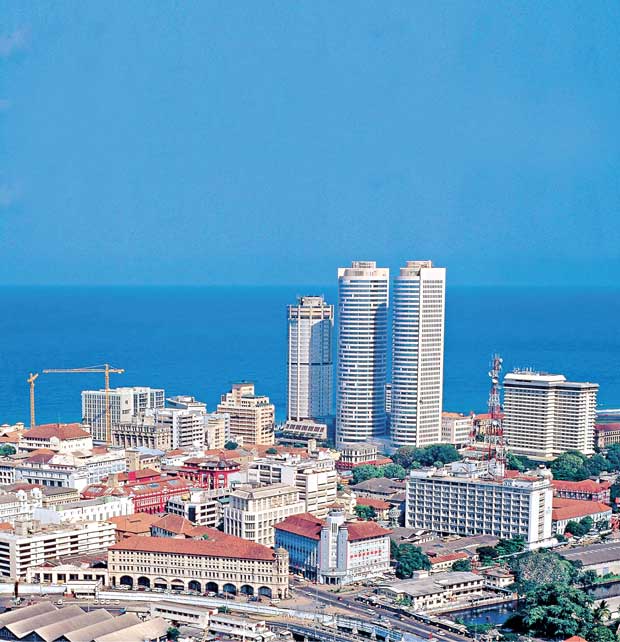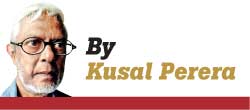Reply To:
Name - Reply Comment
Last Updated : 2024-04-19 21:20:00

Buying power in this consumer society is not that of the poor who “buy to live”-to exist. But buying power is that extra heavy spending for the extra comfort in topping up a comfortable life.
In January 2015, something unique happened. People voted out President Rajapaksa to install a new President. On January 9, Maithripala Sirisena was sworn in. And then, without a Parliamentary election, the “corrupt” partnered the “would be corrupt” to form a new Government. It is now the most corrupt Government, accused of two mega Bond Scams in one year.
Since President Jayewardene established an open market from 1978 with trade liberalising all these Governments have been corrupt with increasing zeal. All through these 40 years, we were thus ruled by both mainstream parties separately for 38 years and for more than two and a half years for now, by this unholy alliance of both the UNP and the SLFP as a ‘good governance’ (Yahapalanaya) Government.
In all these 40 years leaving aside all mega corruptions, nepotism, political arrogance and inefficiency in administration, with every change of Government, the rural folk, that’s 70.4 per cent of the population of this country, Sinhala, Tamil and Muslims all included, lived outside the main market.
They still live in a peripheral, slow moving and almost stagnant market. They don’t have the “buying power” -the extra rupee-to be of any worth in a busy and brisk consumer society, driven by investments for big profits.
Buying power in this consumer society is not that of the poor who “buy to live”-to exist. But buying power is that extra heavy spending for the extra comfort in topping up a comfortable life.
In this free market economy, freedom of “choice” in reality is not for the individual consumer to  spend, but for the investor businessman to choose where to invest for bigger profits.
spend, but for the investor businessman to choose where to invest for bigger profits.
Given the choice, apart from exporting to the global market, they would serve the rich in big city markets. For these markets, the consumer thinking is steamrolled by heavy advertising for increased demand of products and services.
Skylines and road facades say it all.
In Colombo, tall high rise buildings for commercial purposes, mushrooming condominiums and apartment housing, large shopping malls with designer wear, expensive restaurants with Manchurian to Spanish and Western cuisine, departmental store chains, modern private hospitals, well equipped gyms for exercising, toll levying car parks and well laid out large walking and cycling paths for the health conscious show the economic growth of a free market economy.
Neo-liberalism is all about matching the buying power (demand) of the growing urban middle class and the small super rich with that of “supply”.
The expanding Colombo city is everything symbolic about the culture of consumerism with lavish spending.
In Colombo, tall high rise buildings for commercial purposes, mushrooming condominiums and apartment housing, large shopping malls with designer wear
This visual and the feel of fast moving life of consumerism are totally absent in Moneragala or Hambantota, or in Polonnaruwa or Kegalle.
There isn’t a rich middle class that can generate profits for such investments in these rural societies.
It therefore serves no purpose for investors to go to Moneragala with designer-wear shopping outlets. No purpose in opening up high end restaurants in Hambantota.
A way out therefore would be to:
1. Have a carefully regulated market economy that will not turn citizens into robot like consumers, in an atomised society
2. Plan and reform education, health and commuter transport with greater responsibility held by the State
3. Channel investments to planned and identified economic sectors with strict conditions laid down on employee rights and environmental safety
4. Restructure lower tiers of elected representative bodies like local government and provincial councils as participatory democratic structures of governance
5. Ensure public policy making is open, participatory and within a national development plan that is socially discoursed and adopted with short and long term programmes and proposals.
Heavy investments do not go to Polonnaruwa for modern private hospitals, despite medical data on increasing CKD (Chronic Kidney Disease of uncertain aetiology) patients.
It is not just cash flow and profits that define neo-liberal economics. It is the marginalising of rural life, the neglect of once State funded priorities like education, health and transport that defines neo-liberalism. With that is created an ideology that sustains neo-liberal markets.
The ideology that explains consumer choice as “democracy” and “freedom” and justifies free and open markets.
Yet, within that economic democracy and freedom, no government can plan for sustainable economic growth with equal opportunities for all in social development.
Governments are held responsible in planning to attract more and more “investors for export promotion”. This formula is still being chanted as the God given “Mantra” for development.
Within this planning, governments don’t plan for quality improvement of healthcare, of education, of commuter transport, or even for efficient public administration. The logic of a free market economy is that, the consumer decides what he or she wants and that not only decides supply, but also
the quality.
During the last 40 years, Sri Lanka was taken on this route to an elusive world of “development”.
Along this route implementing of labour laws was seen to be gradually relaxing.
Amendments to industrial laws and also laws for easy access and ownership of land were being drafted and enacted. Everything had to be “business friendly” for economic growth. With guarantees by successive governments, investors who came to collaborate with local businesses for export manufacture, were legally allowed untold and unaudited benefits and profits at the expense of public income.
What they earned during their operations here and what the people had to forego as tax and duty incomes have never been assessed. In terms of loss to the people on tax holidays and duty waivers given to investors, it could well be over a couple of trillions of rupees.
The neo-liberal economic model for development has thus left many issues that wouldn’t ever be resolved within an increasingly liberalised market, the type Wickremesinghe leadership in government is desperately pushing for.
Free market has resulted in the richest 20 per cent of the population accruing 52.9 per cent of the national income, while the 20 per cent at the bottom is left with only 4.5 per cent going by 2013 numbers, according to the Central Bank of SL Annual Report of 2016.
The report also says in 2014, the GDP per capita according to provinces had been Rs. 428,212 in Uva, Rs.360,876 in Sabaragamuwa and Rs.417,225 in North Central province while in the Western province it had been almost two fold with Rs.734,094.
This suffocating disparity has left its mark on education, health, public transport and on cultural life of the rural poor.
In Uva 6.5 per cent had no schooling. In Central province it is 5.2 per cent and 4.5 per cent in Sabaragamuwa (CBSL Annual Report, 2016). While in Colombo district there are 185 medical doctors for 100,000 populations, Kalutara, Kegalle, Puttalam, Ratnapura, Moneragala and Mullaithivu have only 50 to 60 medical doctors. In Nuwara Eliya it is 38 doctors. So, is the disparity in distribution of trained nurses (Annual Health Bulletin – 2014).
These major disparities have been growing at different rates for 40 years. A proven fact, this neo-liberal economic model under any government can only keep increasing inequality and disparities in society. It is on top of all these, mega corruption in the political establishment, serious lapses in maintaining law and order, inefficiency with corruption in the bureaucracy is dumped on. It is on top of all these that Sinhala extremism against minorities is patronised.
The BBS boss Gnanasara, who reports to Court he is in hospital is still free, while there are four special Police units deployed to arrest him for racial violence and hate speech.
Ethno-religious polarisation is part of neo-liberalism especially in developing countries, including India under Narendra Modi and in South Asia too. After the 2008 meltdown of the global neo-liberal economy, efforts by the US and British to prop up their economies by bailing out big business with public funds, the lower middle and the working class population including marginalised groups were frustrated.
They wanted a way out for safer and secure economic life. Sanders in the US and Corbyn in the UK are clear projections of this growing political dissatisfaction, articulating deviations from the free market economy.
That remains true for all and Sri Lanka too. We need to find an alternative to this free market economy that drags us without answers for any of the socio economic and cultural issues, not just under one government but under all successive governments.
What could that alternate model be?
The Soviet type “socialism” for sure is no answer. A closed market economy as in 1970-77 in SL was a social burden.
All or most of these would need a new Constitution. That too needs public participation in making. Has to be dialogued in society unlike how it is being engineered now in a parliament that has no credibility and also lacks intellectual participation. Social dialogue will not be to the liking of mainstream political parties entrenched in big business, profiting from this free market.
It is also not possible with corroded thinking in the much splintered “Left” that remains without attraction and without democratic organisational structures to facilitate serious social dialogue. Thus the question is, where and how could this begin. It can only begin with dissenting voices outside traditional social and political organisations and in urban society. From among the more mature in the new generation. Pray, it would.

Add comment
Comments will be edited (grammar, spelling and slang) and authorized at the discretion of Daily Mirror online. The website also has the right not to publish selected comments.
Reply To:
Name - Reply Comment
On March 26, a couple arriving from Thailand was arrested with 88 live animal
According to villagers from Naula-Moragolla out of 105 families 80 can afford
Is the situation in Sri Lanka so grim that locals harbour hope that they coul
A recent post on social media revealed that three purple-faced langurs near t